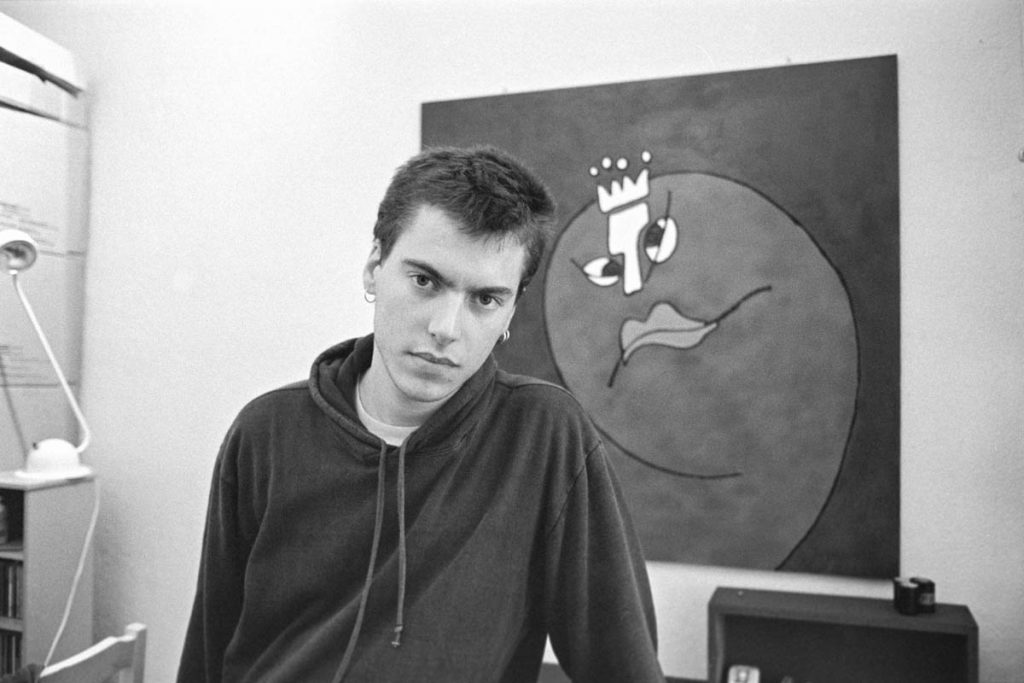from Edmund Carpenter „They Became What They Beheld“
Edmund Carpenter’s sentence sounds like a magic trick. How can you make something invisible in plain sight?
The cliché is the derivative of an original and the original was at some point reality, the world out there, in all its complexity. The original contains the infinity of possible choices that the cliché lacks. Just as a photographic image one looks at is always a retrospective, a glimpse of the image taken at the moment of the moment, a snapshot from the past.
When I look at a picture of me from the past – the possibilities I had then! I could have gone in any direction. And then I went in one direction. And now I’m 49 years old, living as an artist in Berlin, with a job in Switzerland. I could have gone in all kinds of directions, and that includes staying in a small town in Bavaria, like my siblings. Then I would probably still be thinking small-town thoughts today, much like I used to think them.
I would like to ask you to imagine, to visualize this person I am now. An artist who grew up in a small town, went to the big city as a young man and achieved some but not too much success. Imagine this person – that’s me.

(But didn’t we all look like that back then?)
That’s a cliché. The image you have in your head now, of an artist, 49 years old, who has gone from small town to big city and from there to places all over the world.
That’s all you need to know about me.
Just maybe this much: You have no idea who I am. You wouldn’t even recognize me on the street and even if you did, you still wouldn’t have a clue who I am.
You have no idea who I am – I don’t know myself. Who am I, who will I be tomorrow, where am I, where will I be tomorrow, in two years?
If you don’t ask yourself these questions, or can answer them easily, then you probably still are in a small town or have returned there, if only in spirit.
I am: just as complex as you are.
You are as complex as you are at this moment, as complex as I am, as complex as any human being. No matter where you live, whether as an artist in Berlin or as a florist in a small town in Bavaria or as a hunter-gatherer in Papua New Guinea.
Take another look at the cliché you have of me in your head.
Can any cliché ever capture all the complexity?
You think you know who I am because you have a cliché in your head, an image and behind that image I can hide. I can become like invisible. What you, what others see, is the cliché, not me.
This also explains an age-old question I carry with me from the small town: why is it so important what the neighbours think?
In the small town, I watched people constantly working on the cliché (the image the neighbours have of you). They literally worked on it, for example by “sweeping the street in front of the house because of the neighbours”. (“Small World”, 1997, begins precisely with this, “Planet Galata”, 2010, with a similar thought).
They don’t do that in Berlin. Here there is a road service that everyone pays for together, through their taxes. Now, even in Berlin, we sometimes sweep the street in front of our house. But that’s only because my wife happens to have a shop. In any case, we don’t do it because of the neighbours.
In a small town, the cliché is obviously more important, maybe because you have to hide more. In the big city it’s easier to show yourself as you are because you’re anonymous. You appear briefly and disappear again into the masses. You can’t do that in a small town.
In a small town, you can only be who you are if you hide behind high hedges. Behind the high hedges of the cliché. The high hedges are the image that others have of you. Working on your own image is working on the hedge behind which you can make yourself invisible. This is true not only, of course, but especially in small towns. Just about everyone uses this magic trick in one way or another – consciously or unconsciously.
But with the magic trick comes a curse. Two curses, to be precise.
The first curse:
You are only invisible as long as you stay behind your hedge. Today I’m quite happy with my cliché of the artist in Berlin. I can hide behind it perfectly well. In the past, however, I tried a different cliché: young start-up. That was rather uncomfortable, because I was constantly afraid that people would find out about me, that they would look behind the scenery, that the hedge would practically fall down.
But the real curse is another:
It is a cruel exercise to have the feeling of having to hide all the time. This feeling makes one unfree to a great extent. Unfree, if at some point you no longer dare to come out from behind the hedge. You are then tied to your hedge. And probably for life. The only life you have.
Is that what you want? To be tied down by the image others have of you?

